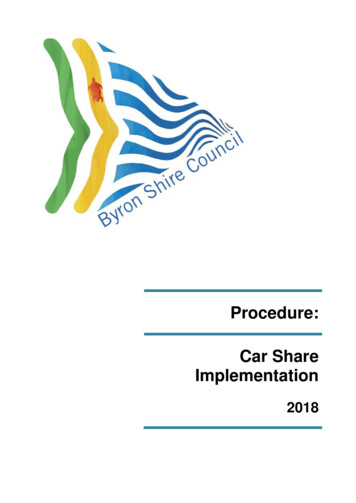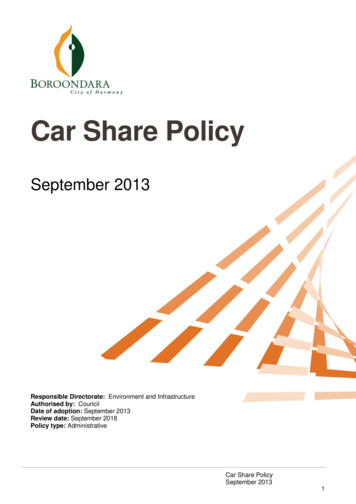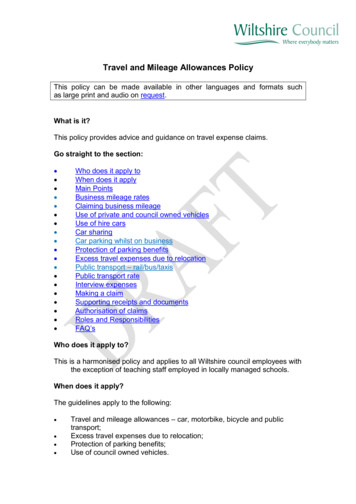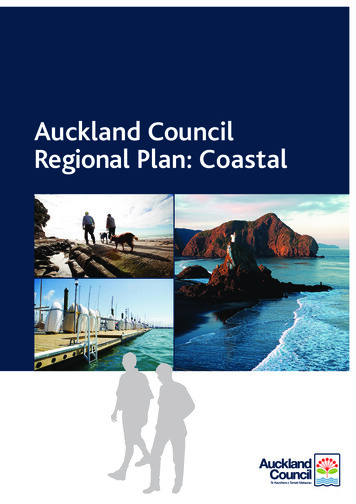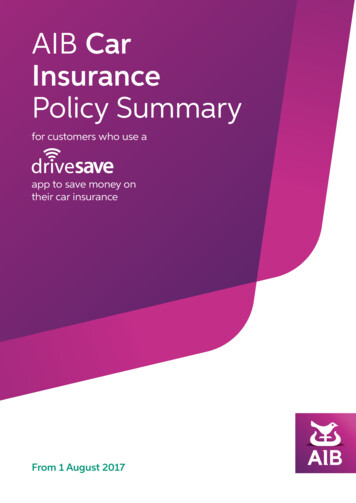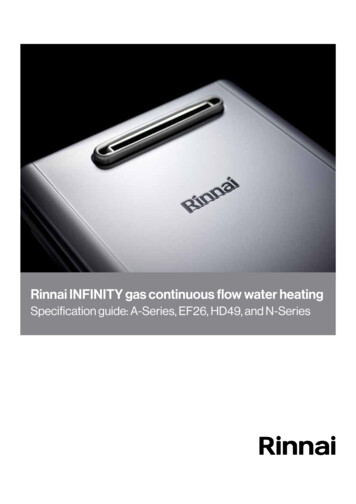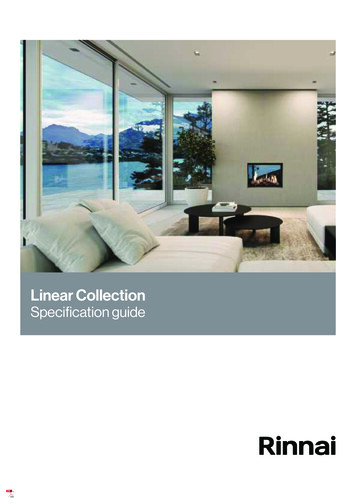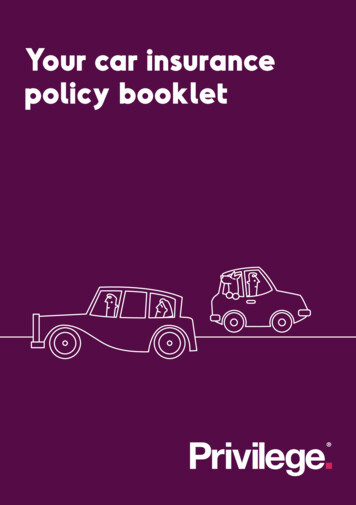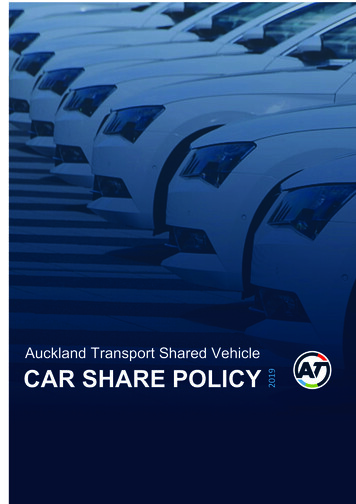
Transcription
CAR SHARE POLICY2019Auckland Transport Shared Vehicle
Document Control History and ApprovalPROJECT NAME:Auckland Transport Car Share PolicyPREPARED BY:Integrated Network Planning, Policy & SustainabilitySTATUS:APPROVEDAPPROVED BY:AT Board on 22 October 2019
Table of Contents1.2.3.4.Overview, purpose and objectives. 11.1Purpose of the policy. 11.2Policy rationale . 11.3Shared Vehicles Definition . 11.4Models . 21.5Governance and AT’s role . 21.6Shared vehicle objectives and principles . 31.7Structure of this Policy . 31.8Policy enactment . 4Benefits approved organisations will receive. 52.1Parking types . 52.2Parking spaces . 6Approval application and assessment . 83.1Assessment of applications . 83.2Shared vehicle permits . 93.3Assessment of requests for shared vehicle parking spaces . 10Conditions of approval . 114.15.Performance Monitoring . 11Summary schedule of fees . 13
1. Overview, purpose and objectives1.1 Purpose of the policyTo outline Auckland Transport’s policy on public shared vehicles (known generally as ‘carshare’) with consideration of Auckland Transport’s core mandate and network outcomes. Inparticular, this policy guides the internal decisions around approval of shared vehicleorganisations within Auckland. It also outlines how Auckland Transport will interact with theoperators, including the process to apply for approval as a shared vehicle operator (‘approvedorganisation’) under the Auckland Transport Traffic Bylaw 2012 (or any equivalent bylaw thatreplaces it).Consideration of this policy does not remove the need to consider any other relevant policy orguidance and any application legislation, regulations or rules etc.This policy only covers motorised vehicles. Cycle, e-scooter and other, more active modalsharing schemes are not covered.This policy does not limit or restrict Auckland Transport’s regulatory role or functions.1.2 Policy rationaleAuckland Transport has a series of strategic objectives which guide policy, planning and allkey outcomes. The Auckland Plan 2050 has a number of transport focus areas that supportcar share initiatives: Make better use of existing transport networks – sharing vehicles means fewercars on the road and lower distances travelled by scheme members, with capacityfreed for other usesMaximise the benefits from transport technology – innovative technology solutionsenable customers to be connected to shared vehicles when they need themDevelop a sustainable and resilient transport system – sharing vehicles helps toreduce emission impacts on the environment as car share vehicles tend to be newer.Auckland Transport considers that there is a rationale for supporting shared vehicle schemes,on the basis of evidence which shows modest but worthwhile benefits. The evidence indicatesthat schemes help to reduce car ownership, with scheme members reducing overall distancetravelled by private vehicle by about 10%. These benefits, however, also need to be weighedagainst other objectives such as management of the competing demands for parking space,particularly within inner areas of Auckland.1.3 Shared Vehicles DefinitionShared vehicles are vehicles available to the public (specifically for scheme members) forshort term hire which provide a mobility option to mitigate the use of personally owned privatemotor vehicles. The common term is ‘car share’, however ‘shared vehicle’ is used in this policyas that is the term used in the Auckland Transport Traffic Bylaw 2012.1Auckland Transport Car Share Policy 2019
The current Auckland Transport Traffic Bylaw 2012 defines ‘shared vehicle’ as “a vehicleoperated by an organisation approved by Auckland Transport to provide its members, for afee, access to a fleet of shared vehicles which they may reserve for use on an hourly basis”.1.4 ModelsAuckland Transport acknowledges the two primary models of shared vehicle operation: station based shared vehicle - vehicles are allocated to specific car spaces and usersmust return them to the starting point at the end of their journey; free floating shared vehicle - vehicles are parked within a ‘home zone’ and users canpark wherever legally allowed within the home zone at the end of their journey. Vehicleswithin the home zone must still comply with the applicable parking regulations.Auckland Transport recognises that each model offers a different type of service to customers.Both have a role to play in improving mobility and widening choices, to assist with reducingthe need for private vehicle ownership and/or use. Both are therefore subject to, and coveredby, this policy.Peer-to-peer models are beyond the scope of the bylaw and policy at this time as they arelargely not publicly available and not requiring public car parking for their operation.1.5 Governance and AT’s roleThis policy is part of a structure for the overall regulatory oversight for shared vehicles inAuckland. The components are outlined below.Auckland TransportTraffic Bylaw 2012Auckland TransportTraffic Control Committee(TCC)The Auckland TransportShared Vehicle(“Car Share”) PolicyBylaw through whichAuckland Transport setsrequirements for parkingand control of traffic onroads (including anybylaw that replaces it inwhole or in part)Committee with delegatedauthority from theAuckland Transport Boardto make resolutionspursuant to certainbylaws, including theAuckland TransportTraffic Bylaw 2012This document, settingout the role of AucklandTransport in determiningapplications for approvalof shared vehicleschemes under theAuckland TransportTraffic Bylaw 2012.Auckland Transport will establish reserved shared vehicle parking, including physicalinfrastructure, consultation and administration requirements, at its own cost. AucklandTransport will also alter or remove reserved shared vehicle parking (as it considersappropriate) at its own cost.The total maximum number of designated spaces within the boundaries of Auckland Councilwhich will be allocated under the policy to shared vehicles is 400 (approximately 5% of thetotal on-street paid parking and time restricted spaces for the Auckland region). This bestrepresents the appropriate level of spaces within the broader parking context at this time, and2Auckland Transport Car Share Policy 2019
will be reviewed regularly in response to the maturing market and external conditions. Theactivation of these spaces depends on the same criteria as outlined in Section 3.Auckland Transport may remove poorly performing shared vehicle spaces. The assessmentwill be based on key metrics aligned to those outlined in Section 4.1 (Performance Monitoring),level of customer complaints, and/or strategic direction imperatives. Auckland Transport mayalso remove spaces as part of other road projects, such as road space reallocation orconstruction works.Auckland Transport will provide approved organisations with up to date information on thelocations/boundaries of the various parking types and will provide approved organisations withnotice of changes to any locations/boundaries within a reasonable timeframe.Auckland Transport will also provide approved organisations with notice within a reasonabletimeframe of any loss of parking due to special events or construction works undertaken byAuckland Transport.1.6 Shared vehicle objectives and principlesAuckland Transport’s objectives for shared vehicles are to: Encourage the use of shared vehicles (with an increasing membership and increasedutilisation), to reduce private car use. Ensure shared vehicle schemes represent an effective use of scarce parking resources. Ensure shared vehicle transport outcomes complement other ‘shared mobility’initiatives. Comply with relevant legislation.Given the above objectives, the principles used in the formulation of the policy are: Implement a transparent, open and ‘level playing field’ to enable shared vehicleapproved organisations to compete. Acknowledge approved organisations may run station-based and/or free-floatingschemes, so Aucklanders can benefit from different mobility options. Ensure decisions concerning parking for approved shared vehicles are transparent andconsistent with other parking policy outcomes, such as parking to support retail andoperations. Ensure where possible that the policy helps Auckland Transport operate in a financiallyresponsible manner.Shared vehicle and shared mobility options will continue to grow and evolve in Auckland. Thispolicy is therefore expected to adapt over time and undergo review as needed, with anychanges to conditions being rolled into the next approved organisation approval.1.7 Structure of this PolicyShared vehicles operate with a range of elements, all of which interact and depend on eachother. This Policy has been deliberately structured as follows:3Auckland Transport Car Share Policy 2019
Section 2 - An outline of the benefits that approved organisations will receive fromAuckland Transport. Section 3 - An outline of the factors that Auckland Transport will consider whenassessing applications for approvals. Section 4 - An outline of the conditions that Auckland Transport will impose on theapproved organisations as part of the approval, aligned to each element.1.8 Policy enactmentThis Shared Vehicle Policy was approved by the Auckland Transport Board on 22 October2019 and is enacted from that date. It replaces any previous policy or legal agreements aroundcar share.4Auckland Transport Car Share Policy 2019
2. Benefits approved organisations will receiveIf approved, the organisation will gain the following core parking benefits: The ability to park their shared vehicles in parking spaces reserved for shared vehicles The ability to park their shared vehicles in parking spaces where ‘authorised vehicles’are exempt from the parking restrictions that otherwise apply. Discounted on-street parking for the first year of the approved organisation’s approvalperiod. The ability to apply for discounted leases in off-street Auckland Transport managedcarparks (whether buildings or at ground level).The details of these benefits are provided below.2.1 Parking typesThere are five primary types of public parking in Auckland operated by Auckland Transport: Paid parking (on-street and off-street) – users can remain in the parking space for aslong as they pay Time restricted parking (general) – free to use, however users can only remain parkedfor the maximum time displayed on the regulatory signs on site Resident parking zones – two types:o ‘Resident permit holders only’ - only available to vehicles with resident permito ‘Time restricted, but authorised vehicles exempt’ - free for any vehicle to use up tothe maximum time stated, however permit holders are exempt from the timerestriction and may park for any period. Reserved parking – parking that is reserved for a particular class of vehicle only. Freeto use if the vehicle belongs to the reserved class e.g. spaces reserved for ‘sharedvehicles’ Unregulated parking – available to everyone without any parking restrictions.It is important to note that in terms of paid parking and time restricted parking these can be inthe form of either a zone or along a length of kerb between two points.5Auckland Transport Car Share Policy 2019
The following are the on-street parking arrangements for vehicles which are operating underan approved shared vehicle scheme:ParkingLocationOutside of hire period (caris in home zone or sharedvehicle space)When parked duringhire periodPaid parkingThe approvedorganisation will pay theparking charge identifiedon signage either beforeor at the time of parking.Approved organisationswill receive a 30%discount for the first yearof their approval period,after which standardrates apply.The customer will pay theparking charge accordingto signage, unless theapproved organisationchooses to pay instead.Note that the approvedorganisation, as theregistered vehicle owner,agrees to accept liabilityfor any infringement costsincurred by its customers.Reservedparking forsharedvehiclesonlyNo time restriction for shared vehicles.TimerestrictedparkingShared vehicles must comply with all time hiclesexemptNo time restriction for shared vehicles holding a permit*.Permitted shared vehicles are ‘authorised vehicles’.UnregulatedparkingSignageSignage will determine whether payment is required,which must occur as outlined above.Note that there are some signed ‘resident permit’ zonesalso in operation which are progressively being replacedwith ‘authorised vehicle’ zones. Permitted vehicles arenot allowed to park in ‘resident permit’ zones.n/aNo cost or time restriction*Note that AT will continue to monitor the impacts of this dispensation and may revoke it by furtherdecision of the TCC.2.2 Parking spacesOn-street parking spacesThe Auckland Transport Traffic Bylaw 2012 provides for Auckland Transport to reserveparking solely for shared vehicles (being vehicles operated only by those approved under theBylaw). Any reserved parking spaces will be indicated by signage and road markings toidentify them as reserved spaces for shared vehicles. These spaces will be made subject tothe payment of parking charges if they fall within a paid parking zone. These spaces will be6Auckland Transport Car Share Policy 2019
open for use by any permitted vehicle of any approved organisation – they are not restrictedto specific vehicles or approved organisations.On-street parking spaces are a particularly valuable public asset which provide public accessto business/recreation/shopping, enable deliveries which sustain businesses and provideopportunities for other mobility options or urban street amenities. On-street parking is a limitedresource with competing demands.Auckland Transport will assess requests for additional reserved spaces in light of the widerpublic interest and consideration of other competing parking demands and will reassess theneed each time a new operator gains approval from Auckland Transport as an approvedorganisation. Decisions to reserve parking under the Auckland Transport Traffic Bylaw aremade by the Traffic Control Committee and may follow consultation with affected parties.Auckland Transport cannot guarantee or pre-determine the outcome of that process, whichcan take several months.Auckland Transport will seek wherever possible to group multiple spaces in high-demandareas where a benefit to the public interest can be demonstrated and will seek input fromapproved organisations.Auckland Transport must balance multiple demands for space in the road network, especiallyon arterial roads and in key centres, which are increasingly in conflict with kerbside carparking. These demands, such as improving the reliability of public transport, supporting thedevelopment of the cycle network and balancing the movement and place functions of roads,may necessitate the removal of parking spaces including those which are reserved for sharedparking.Off-street parking spacesAuckland Transport can offer discounted leases in some off-street Auckland Transportmanaged carparks, including reserved spaces for an approved organisation’s exclusive use.7Auckland Transport Car Share Policy 2019
3. Approval application and assessmentAll shared vehicle operators wishing to access the parking benefits available to approvedshared vehicle operators (‘approved organisations’) can apply for an approval from AucklandTransport. Approved organisations will be provided with digital permits for each vehicle intheir fleet (see Section 3.2). Approvals may be issued subject to a range of conditionsincluding performance monitoring (see Section 4 for more detail).This section outlines the process by which Auckland Transport will consider applications forapproval, including the information that must be provided.Auckland Transport manages and controls parking in the public interest and must act in afinancially responsible manner. Given competing demands for parking spaces and the costsincurred by Auckland Transport in establishing reserved parking for approved shared vehicles,Auckland Transport wishes to ensure that the parking privileges provided to approvedorganisations are providing maximum public benefit. It is the benefit to the wider publicinterest, rather than the private commercial interests of an approved organisation, that willform the basis of Auckland Transport’s decisions.All approvals will be for a maximum term of 3 years and will be subject to the approvedorganisation meeting certain performance standards as set by Auckland Transport.At the end of the 3-year period, a re-assessment of the approved organisation will take place,and any subsequent approval would consider the circumstances at the time and reflect anychanges to this policy.To apply for approval, organisations must complete and submit the Application for approvalas a Shared Vehicle Organisation form. Approved organisations must provide enoughinformation to Auckland Transport at the time of application to enable Auckland Transport toensure all requirements of the policy will be met by the organisation if approved.3.1 Assessment of applicationsAuckland Transport recognises that shared vehicle organisations have their own businessimperatives and may operate in different ways. Auckland Transport will exercise its discretionin assessing an application based on the following criteria: An ability to work with Auckland Transport to provide a method to pay for share vehicleparking at or by the time of use. Shared vehicles must have a 5-star ANCAP (Australasian New Car AssessmentProgram) rating, be fully maintained and comply with all relevant regulations. As atransitional measure, vehicles which can be demonstrated as being part of a regular carshare fleet at the time this policy is enacted are exempt from the safety standard.However, this exemption will end for all vehicles at the commencement of the secondthree-year approval period. The organisation must hold and maintain a valid rental service license under the LandTransport Rule: Operator Licensing 2017. This includes provisions to ensure users holda valid license applicable to the vehicle type.8Auckland Transport Car Share Policy 2019
Shared vehicle organisations must agree to accept liability for any infringement costsaccumulated by customers, including the requirements for infringement outlined in LandTransport Rule: Operator Licensing 2017. Deliver an ‘open access’ operational model that includes:o A scheme of sufficient scale, with widespread and convenient access to vehicleso Use of the shared vehicles which is open to the general public with only reasonablerestrictions (such as a valid license applicable to the vehicle type, basic creditworthiness and adequate driver history)o Shared vehicles being available 24 hours/7 days a weeko Transparent costs and rates to hire vehicleso Provision of an operational plan to respond to any parking or vehicle issues, includingbut not limited to, bunching of shared vehicles in areas affecting access for otheruserso Provision of a plan for growing long term membershipo Encouragement of high turnover of bookings for each vehicle to facilitate wideutilisation An ability to provide AT with a monthly data report in standardised format, through anapplication programme interface (API) Processes to ensure vehicles that are incapacitated for any reason are removed within24 hours A rationale for proposed Home Zone boundaries (if the scheme requires one)It is preferred, but not mandatory, that vehicles display the organisation’s livery or logo foreasy recognition.Additional criteria will be added to the next version of this policy to mandate that vehicles inapproved organisation fleets comply with the Central Government’s forthcoming 2022emissions standards.Auckland Transport may decline any application on reasonable grounds. If declined, whileoperators could provide a shared vehicle operation in Auckland, they would not be able to gainthe parking benefits provided to approved organisations.3.2 Shared vehicle permitsSuccessful approved organisations will receive permits in conjunction with their approval. Thepermits are the legal mechanism by which shared vehicles can access some of the parkingadvantages available to them.The following are the key components of the Permit system:Permit System ComponentsType ofpermit1 digital permit issued to each vehicle per annum available for hire as partof the fleet, linked to the vehicle licence plate.Conditions Permits are not to be used for organisation staff parking.of permit Permits are only valid in areas signed as “time restricted except authorisedvehicles” and/or “shared vehicle spaces”.9Auckland Transport Car Share Policy 2019
Permit System Components Permits may be transferred from one vehicle to another, provided that: The details of the vehicle are provided to Auckland Transport The approved organisation owns or leases both vehicles The vehicle to which the permit is transferred is a replacement for avehicle removed from the car share fleetPermitfeesCriteria foradditionalpermits Annual fee per permit, which represents the reasonable cost incurred ingenerating the permits and may change as costs change. Note the permit cost is not re-incurred if the approved organisation replacesthe vehicle, as long as AT is informed in advance and the applicable stepsare taken through the approved organisation’s Auckland Transport account.There is no limit on the number of permits that could be issued, but demandfor more must be demonstrated based on fleet performance and will beassessed based on demand, the cumulative impact on wider parking policyand transport objectives, along with other metrics included in thePerformance Monitoring, Section 4.1. Note that Auckland Transport will notprovide additional permits where significant parts of an approvedorganisation’s fleet are not operating effectively.3.3 Assessment of requests for shared vehicle parking spacesAs outlined previously, approved organisations can request additional shared vehicle spacesbe provided by Auckland Transport. As part of the internal assessment Auckland Transportwill undertake before commencing a public consultation process, the proposal will beconsidered against the following criteria: Proximity of other reserved shared vehicle spaces Level of usage of nearby shared vehicle spaces Performance of all shared vehicle spaces, particularly spaces used by the approvedorganisation applying, with a view to substituting an existing, underperforming space forthe proposed new space Local context and parking demand/supply, as well as future parking allocation,catalysing projects or developments and strategic direction.10Auckland Transport Car Share Policy 2019
4. Conditions of approvalThe core conditions which approved organisations will be required to comply with as part oftheir approval by the Auckland Transport Traffic Control Committee (TCC) are: Approved organisations must attend regular quarterly meetings with Auckland Transport(more frequently on start-up), regarding data and reporting, operational performance,and these conditions of approval. Approved organisations must fully co-operate with Auckland Transport to resolve issuesrelating to the operation of the scheme, including but not limited to:o identifying home zone boundaries (for free-floating models), and the procedure toadjust boundarieso strategies to overcome bunching of shared vehicles in certain areas (includingwhere the cumulative effect of vehicles from multiple organisations is creatingbunching)o resolving any issues with automatic payment systems used for paying AT parkingcharges when required Auckland Transport will inform applicants of any reasonable concerns with theirproposed geographic boundaries or home zone(s), so issues can be discussed andresolved as part of the application process. Approved organisations must ensure that their operation, vehicles and users complywith all legal requirements. Approved organisations must ensure that every vehicle available for hire as part of thefleet has a valid Auckland Transport permit. While users should pay any parking charges and adhere to any parking rules associatedwith the vehicle use during their hire period, the approved organisation, as the registeredvehicle owner, agrees to accept liability for any infringement costs accumulated bycustomers while using the vehicle. Approved organisations must ensure reasonable customer access to vehicles at alltimes. Approved organisations must provide Auckland Transport with monthly data of theiroperations as outlined in ‘Performance Monitoring’. The specifics of the informationrequired will be provided at the time of approval.The TCC may exercise some discretion as to the particular conditions of approvalacknowledging shared vehicle organisations operations and business models may vary.If Auckland Transport believes an approved organisation is in breach of the conditions of theapproval or permit, it will endeavour to resolve the issue with the organisation directly. If thiscannot be resolved to its satisfaction, then it may consider cancellation of the approval andpermits.4.1 Performance MonitoringThe performance of a shared vehicle scheme will be assessed on data provided to AucklandTransport by the approved organisation. Auckland Transport may also use other data sources,11Auckland Transport Car Share Policy 2019
including data from the Auckland Transport Park app and information from Auckland TransportParking officers.Auckland Transport will require an annual membership survey, in collaboration with theapproved organisation, with questions agreed and approved by both parties and distributedby the approved organisation, with all results shared with Auckland Transport, in ananonymised format.Approved organisations are required to provide anonymised data of their operations in astandardised format, that would allow the below tabled information to be extracted by AucklandTransport. It is mandatory for approved organisations to provide a suitable applicationprogramme interface (API) to Auckland Transport. This information would be kept confidentialby Auckland Transport.On the re-assessment of an approved organisation, after a 3-year approval period, a range offactors will be considered, including performance data track record, the outcome ofmembership surveys, and the impact of the shared vehicle scheme on the wider transportsystem.Data RequirementsUnique users per vehicle*Trips per user per vehicle*Vehicle dwell time (time not hired) per vehicle and location*Number of discrete members and their location (residential or business suburb)Unique users per vehicleConfirmed bookings per vehicleBooking length per vehicleTrip distance per trip per vehicleTrip time per trip per vehiclePercentage of one-way trips (if applicable)Spatial representation of trips (origin street and destination street) per trip per vehicleAverage hire costs per userNumber of approved organisation app downloadsDetails of the number of car relocations needed (outlining where they were and wherethey were moved to)*performance metricFuture versions of this policy will develop minimum performance standards for sharedvehicles and shared vehicle spaces.12Auckland Transport Car Share Policy 2019
5. Summary schedule of feesItemCostCommentsPermits 70/vehicle/perannum*Approved organisations may transfer permitsfrom one vehicle to another, provided thatconditions stipulated in section 3.2 are met.*Note that this cost is subject to regular reviewand will change over time. Operators will beadvised at the time of their application to beapproved organisations what the current rate is.Paid parkingcostsAt rates asdisplayed atparkinglocationApproved organisations are liable to pay theparking charges in pai
Auckland Transport Car Share Policy 20191 1. Overview, purpose and objectives 1.1 Purpose of the policy To outline Auckland Transport's policy on public shared vehicles (known generally as 'car share') with consideration of Auckland Transport's core mandate and network outcomes. In

